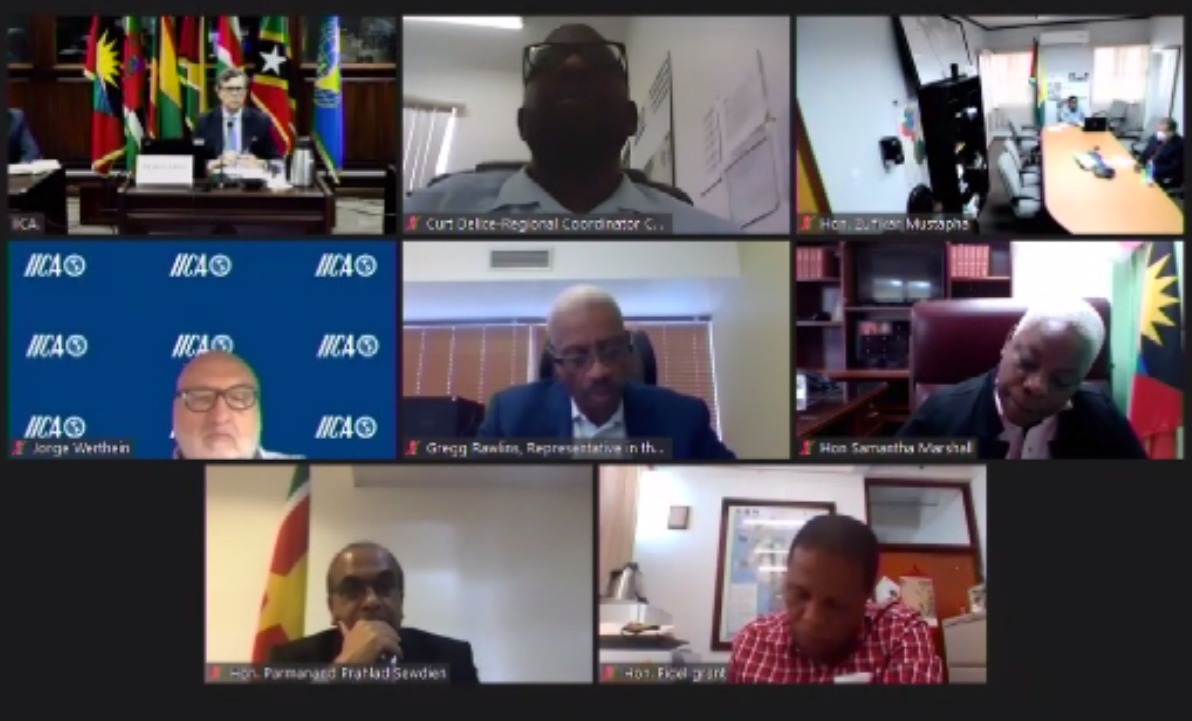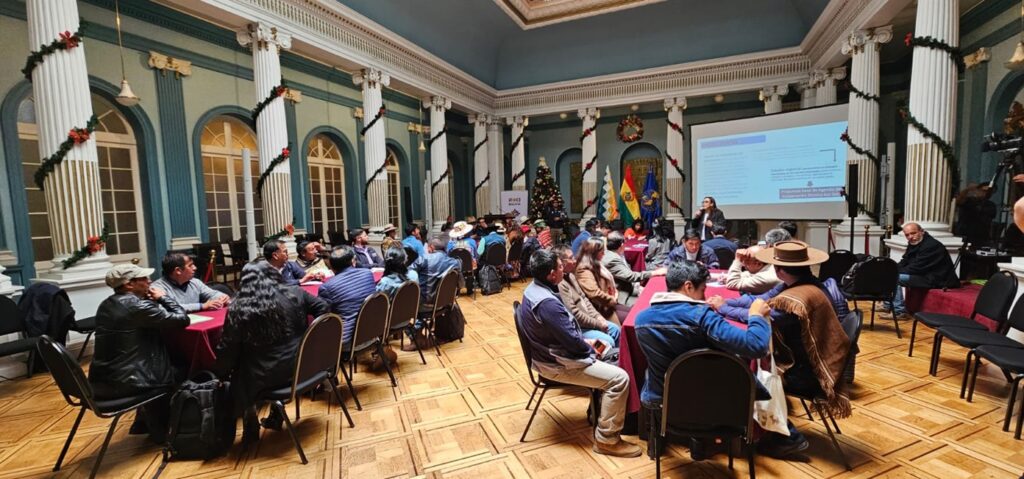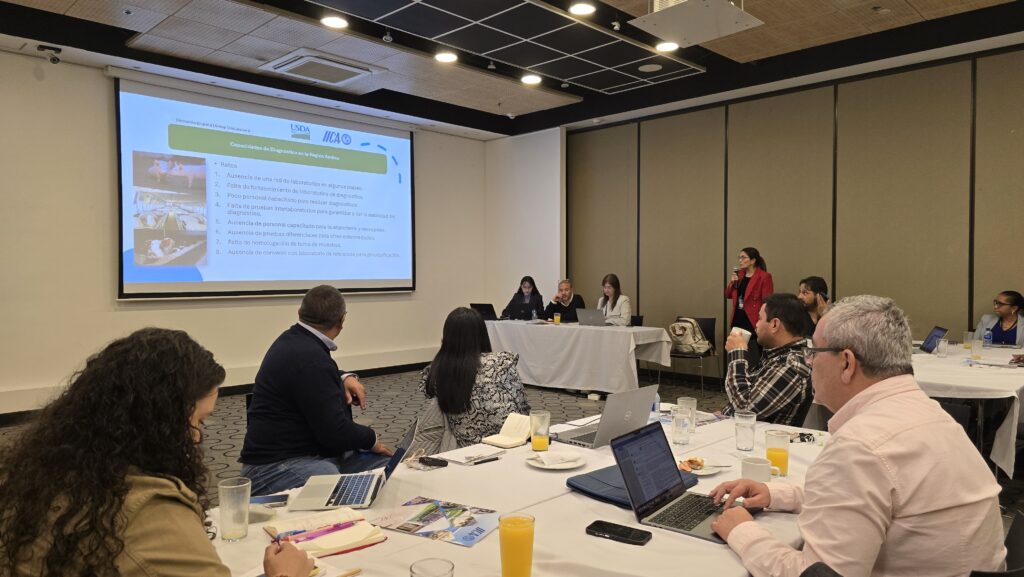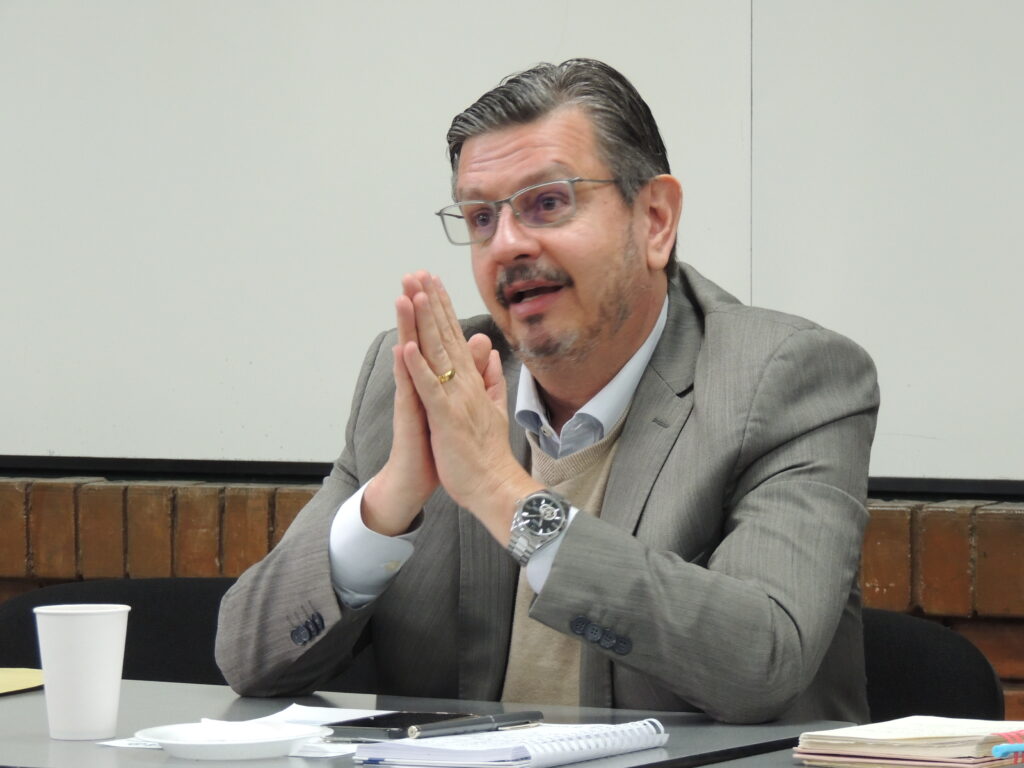Los ministros de Agricultura del Caribe compartieron experiencias en el contexto del combate a la pandemia e intercambiaron información sobre la crisis creada por la parálisis del turismo. Vislumbran políticas comunes para un desarrollo del agro -clave para reducir las importaciones de comida- con apoyo del IICA.

San José, 26 de octubre de 2020 (IICA). Los ministros encargados de Agricultura del Caribe analizaron los desafíos planteados por la actual crisis provocada por la pandemia, compartieron experiencias de políticas públicas, y debatieron estrategias para la recuperación, en medio de una situación apremiante por la paralización del turismo y la debilidad de las economías de la región.
Los ministros coincidieron en que son tareas pendientes capacitar a los pequeños productores para que accedan a financiamiento, aprovechar los avances tecnológicos y establecer una mayor y real sinergia con el turismo, y elogiaron la labor del IICA para apoyar a los gobiernos en la generación de estrategias para incrementar capacidades, resiliencia y relacionamiento con especialistas.
En el diálogo entre los ministros de Antigua y Barbuda, Dominica, Granada, Guyana, San Cristóbal y Nieves y Surinam, del que participó el Director General del Instituto Interamericano de Cooperación para la Agricultura (IICA), Manuel Otero, estuvo en el primer plano la necesidad de reducir la factura en importaciones de comida a través de un mayor desarrollo de la agricultura.
“Nuestra visión es incrementar el valor agregado de la agricultura para reducir la factura de importación (de alimentos). Agradezco el esfuerzo del IICA y su contribución en la Comunidad de Países del Caribe (Caricom)”, dijo el Ministro de Agricultura de Guyana, Zulfikar Mustapha.
“Somos afortunados de tener instituciones para apoyar a un sector sumamente importante para la seguridad alimentaria y el desarrollo de nuestros países. Si la Caricom puede mejorar su agricultura, el dinero se puede quedar en la Caricom”, agregó Mustapha, resaltando que los recursos podrían ser destinados a para mejorar la resiliencia de la región ante el cambio climático.
En la reunión, Otero se refirió a lo que denominó como “un falso dilema” entre la agricultura y el turismo en la región.
“La opción no es turismo o agricultura. Es más agricultura para más turismo. Debemos reforzar el turismo aprovechando todas las ventajas de la agricultura”, dijo el Director General del IICA, poniendo también a disposición de los ministros las experiencias del IICA en materia de bioeconomía, de modo de aprovechar el potencial de la biomasa residual y la biodiversidad.
Los ministros coincidieron en la necesidad de impulsar la actividad agropecuaria como una forma de proveer suficientes alimentos a la población y generar empleos, fortaleciendo capacidades técnicas y productivas acompañadas de un acceso más fácil al financiamiento, con un apoyo constante en materia de cooperación técnica a través de organismos internacionales como el IICA.
“Durante años hemos enfocado nuestros esfuerzos mayormente en el turismo, pero, recientemente y a raíz de Covid-19, se ha dado más atención a la agricultura. Tenemos que hacer ambas cosas, para atender a la industria turística con productos frescos y oportunidades de trabajo a la población”, expresó Peter David, ministro de Agricultura, Forestación y Tierras de Grenada.
Por su parte, Fidel Neil Grant, ministro de Agricultura y Seguridad Alimentaria de Dominica, expresó que “quisiéramos un enfoque más centrado en negocios para la agricultura y la pesca, no tenemos información suficiente de producción como para que los bancos desembolsen créditos, los productores no están educados en este sentido. Estamos trabajando en conjunto con el IICA para apoyarlos”.
En la reunión virtual se coincidió en la visión que la pandemia, con la crisis que generó, conlleva también la posibilidad de resolver problemas estructurales, como la falta de capacitación y la apertura de la región a nuevos negocios agropecuarios.
“Nuestros países están viviendo un impulso renovado por consumir lo local, causando un nuevo interés y mayor vigor de la agricultura. No tenemos que esperar a la próxima pandemia para enfrentar desafíos que vemos arrastrando ya hace mucho tiempo. Con un enfoque holístico estamos fortaleciendo a los productores en las diferentes áreas, para que los pequeños productores puedan desarrollarse y reducir la factura en las importaciones”, dijo Alexis Jeffers, Ministro de Agricultura, Tierras, Vivienda, Cooperativas y Pesca de San Cristobal y Nieves.
“Hubo una total coincidencia de los ministros en la importancia del aporte del IICA y en el apoyo a las propuestas del IICA para empoderar a los agricultores familiares, por ejemplo, a través de asistencia a través de la telefonía celular. También en la necesidad de cuidar los recursos hídricos y el recurso suelo”, dijo el Director General del IICA, Manuel Otero, quien adelantó el próximo lanzamiento por parte del organismo especializado de un programa hemisférico de recuperación de suelos y suelos vivos en alianza con la Universidad Estatal de Ohio.
Otero, también, expresó la voluntad del IICA en aumentar el apoyo al Caribe en materia de comercio y de sanidad agropecuaria, y ofreció la conformación de un foro permanente de diálogo para que la región mantenga la interlocución activa ante la crisis, que exige soluciones supranacionales.
“Nuestro compromiso es contribuir en el logro de un aumento de los niveles de productividad para reducir las importaciones de alimentos. El IICA está aumentando sus apoyos para promover la seguridad alimentaria y nutricional. Es la hora de la resiliencia”, dijo el Director General del IICA, institución que está movilizando cuantiosos recursos financieros en el Caribe.
Desafíos y oportunidades
Un aspecto destacado fue lo mucho que necesita integrarse la región, en la que países con ventajas competitivas complementarias podrían hacer la diferencia para llevar a la agricultura caribeña a un nuevo nivel.
“Debemos desarrollar un nivel de apoyo muy firme para incrementar nuestra producción agrícola. Nosotros debemos asumir la iniciativa de establecer la relación entre países para intercambiar conocimientos y fortalecer nuestras posiciones”, dijo Samantha Marshall, Ministra de Agricultura y Pesca de Antigua y Barbuda.
En apoyo a esa transformación de la agricultura caribeña, el IICA ha ejecutado, en coordinación con los diferentes Ministerios, proyectos para apuntalar el crecimiento sostenible de industrias como la apicultura, la ganadería, la avicultura, la producción de alimentos en ambientes protegidos y la incorporación de tecnologías digitales.
“Reconocemos el amplio potencial de la agricultura en Surinam. Hoy el desarrollo de la cadena de valor del coco y el fortalecimiento de la apicultura son sumamente importantes para nuestro país. El IICA ha contribuido en la generación de capacidades en muchos campos como la agricultura inteligente y el clima”, mencionó Parmanand Prahlad Sewdien, Ministro de Agricultura de Surinam.
De acuerdo con los ministros, la cooperación proporcionada por el IICA ha sido crítica para la agricultura de la región y se torna aún más valiosa en momentos en los que el sector ha adquirido una nueva relevancia.
“Su equipo ha sido de gran ayuda en el terreno con los pequeños agricultores para dar insumos y medicamentos para el ganado. Nos ha servido para tener un enfoque más estructurado en la atención de la pandemia”, destacó la Ministra Marshall, de Antigua y Barbuda.
“La mayoría de los problemas que limitan la agricultura en el Caribe son supranacionales. Concordamos con la necesidad de empoderar a los pequeños agricultores, la única manera de empoderarlos es capacitándolos en áreas que cambien el paradigma como la bioeconomía. Debemos avanzar por esta vía protegiendo y aprovechando de manera sostenible el agua, los suelos y, en especial, apuntando a la biotecnología de manera más intensiva”, destacó Otero.
Más información:
Gerencia de Comunicación Institucional.
comunicacion.institucional@iica.int










